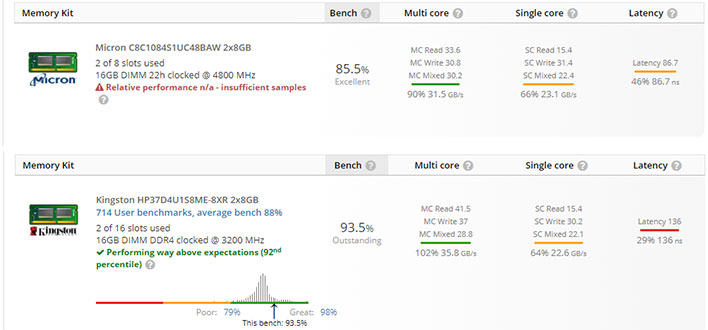It won't be long now before we can run some officially sanctioned benchmarks with finalized Alder Lake silicon, assuming no last minute delays put a cramp in Intel's plans to
release its next-gen CPUs before the end of the year. Alder Lake is poised to be an interesting launch for multiple reasons, one of which is that it supports both DDR4 and DDR5 memory. While we wait to see how it all shakes out, a couple of benchmark leaks gives us an early look at how performance might compare when going from one to the other.
Direct comparisons are a little tricky because both memory types will not be supported on the same motherboard. So there will be platform differences, in addition to using different memory types. Nevertheless, with all other things being equal (or close to equal), it will be interesting to see if
DDR5 memory offers a worthwhile performance gain over DDR4.
What those pair of leaks we mentioned? At the end of July, we wrote about a UserBenchmark entry with a
16-core/24-thread Alder Lake-S desktop CPU, featuring a reported 1.8GHz base clock, 3.05GHz average boost clock, and paired with 16GB (2x8GB) of DDR5-4800 memory from Micron.
The CPU is likely a Core i9-12900K, and it looks like a newer leaked entry is using the same chip, but is instead in a platform running
16GB (2x8GB) of DDR4-3200 memory from Kingston.
Here's a look at the memory benchmarks for each one...
 Click to Enlarge (Source: UserBenchmark)
Click to Enlarge (Source: UserBenchmark)
The top results show benchmark data for DDR5 memory in an Alder Lake-S setting, while the bottom set of results highlight DDR4 benchmark results. Both appear to use the same CPU, though the newer entry with DDR4 memory shows a higher average boost clock at 3.65GHz.
That said, here's how the two sets of memory data points compare...
- Multi-Core Read: 41.5 (DDR4) / 33.6 (DDR5)
- Multi-Core Write: 37.0 (DDR4) / 30.8 (DDR5)
- Multi-Core Mixed: 28.8 (DDR4) / 30.2 (DDR5)
- SIngle-Core Read: 15.4 (DDR4) / 15.4 (DDR5)
- Single-Core Write: 30.2 (DDR4) / 31.4 (DDR5)
- Single-Core Mixed: 22.1 (DDR4) / 22.4 (DDR5)
- Latency: 136 (DDR4) / 86.7 (DDR5)
Surprisingly, in the places where the benchmarks show a performance difference, they highlight bigger gaps in favor of DDR4 over DDR5, such as the mulit-core read and write results. Otherwise, the only seemingly meaningful victory in favor of DDR5 is the latency measurement.
We caution not to read too much into all this. We have no idea what memory settings each platform is using, and other factors can skew results in one direction or the other as well. That said, it is at least interesting to see DDR4 hold its own in this particular comparison, with results that are up to 24 percent better.
All that said, DDR5 is definitely the future, but it may take some time for it to leave DDR4 in the dust.



